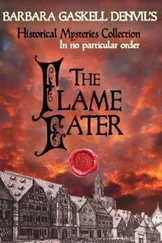“Go back to sleep” was all I could think to say, and I draped a bath towel over her, leaving her to rest on the cold tiles.
At home I took charge of what remained of our dwindling domestic project, the blending of food into shakes, the cleaning of all our gray traces. I formed a packing plan, a strategy with regard to the luggage, mapped a route to outskirt lodging. Our pajamas, robes, towels, dishrags, these I washed every day, closing myself in the laundry room where the hot engine of the machine drowned out noise and thought. Against the hum of the washer I was, for a little while, nobody much, and this was how I preferred it.
I left Esther’s warm, folded clothes in her bedroom. Often they went untouched. Or later, after Esther had plowed through the house before returning to her gang, I’d find the pile toppled onto the floor, a heap of black crumbs, like someone’s ashes, dumped over it.
Claire’s robe went mostly unwashed, because she didn’t like to take it off, and if I ever found her half asleep and staring into nowhere from her resting place, she wouldn’t respond when I asked if I could do any laundry for her, she’d just smack her lips to indicate thirst.
“It’d be nice to have fresh clothes, right? I could clean these and have them right back to you.”
I tugged at her robe and she pulled away from me, threw an arm over her face.
“Your robe will be nice and warm out of the dryer. We could get you covered in extra blankets in the meantime. It’ll be nice to be clean. You’ll feel better.”
I spoke to Claire as if she understood me, but she only stared. I spoke to her through a stiff, heavy face that seemed fitted on my head solely to block me from speaking. I sounded like a man underwater.
As our tolerance departed for the speech of children, so, too, did our ability to speak. Language in or out, we heard, produced, or received. A problem any which way.
To keep Claire hydrated I’d have to peel back her hospital mask, prop her upright, and press the sippy cup straw through the gluey seal of her lips.
I lowered the mask when she was done and flowery welts of orange juice soaked through the fabric.
When it was time to clean her, I filled a bowl with warm water, settled it over a towel at her bedside. With a washcloth I soaped her neck and face. She lifted her chin, gathered her hair out of the way. I squeezed little pools of water over her throat. I placed another towel under her feet, then lifted and washed each leg, rubbing as softly as I could, watching the little streaks of redness follow my cloth.
Claire’s legs rose too easily in my hands, as though they’d been relieved of their bones.
With the last of the water I reached into Claire’s robe and washed her stomach, the skin that once held her breasts. I peeled her from the bed so I could wash her back, pushing the washcloth under the robe, feeling each hollow between her ribs, a sponginess I did not want to explore. Then I settled her back down again, pulled up her covers, lifted the mask from her mouth so I could replace it with a clean one.
She forced a smile, but a shadow had spread under her gums, a darkness inside her mouth.
When I brought her soup, warmed the long bread she loved, or offered Claire some of the candies that usually she could never refuse—baby amber globes with a cube of salted caramel inside—at most she would roll over, heave, pull the quilt above her head.
It was only when the front door swung open and Esther came in the house sweating, crazed, in clothing I’d never seen, that Claire sat up, drawing on some last reserve of power. She always wanted to catch sight of Esther, to watch her from a doorway, so she followed her from room to room, keeping her distance, and Esther tolerated the stalking. You could see in her whole body the effort she made to endure this attention she loathed.
Esther had changed. Her face was older, harder. Filthy from her outings, but spectacularly beautiful. Of course I must think this, I’m her father. Fathers do not easily succumb to assessments of ugliness where their children are concerned. Esther had never been a cute child, but she’d grown threateningly stunning in the last few months. She let her mother watch from a safe perimeter and she was considerate enough not to turn on her with speech, to stop and speak until Claire fell. Esther saw her mother in doorways, looked away, said nothing. It was her greatest kindness to us, that silence. I will always appreciate the restraint she showed in those last days.
Esther’s birthday fell on a Sunday. Claire was oblivious, wheezing beneath the medicated linen I’d dipped for her. I realized what the day was late in the afternoon after crawling on the floor of the shower, the water softening my face.
What was called LeBov’s Mark had grown in fast, a hardened lump under my tongue, anchoring it down. The shower seemed to help. On the tiled floor I could tilt my face into the spray, let the heat loosen my throat. In the bathroom I exercised my voice so that it would not flow from me in shapeless moans.
Last year, when Esther turned fourteen, she’d wanted no party, just money and privacy. She used those words exactly, then said: “Why would you even ask me what I want if you have no intention of delivering on it?”
Delivering on it was her phrase. To which Claire and I could only shrug, agree, say Okay, sure, we can give you that, Honey . And then we wondered, How much? How much money, how much privacy does she want?
Esther wanted us to promise that we’d not talk about the birthday, not mention her age, absolutely not remark on how she’d grown up or changed or stayed the same, not reference what she was supposedly like as a baby, since why would I want to know , she’d asked, what you think you used to think of me? She claimed such a detail was an obscure statistic, a piece of information that future corpses —her phrase—stored in their bodies as a charm.
Esther reasoned that, in any case, we never felt fondly toward her at the time , that we loved her best in hindsight.
It was true. Our family suffered from issues of calibration.
“Even now,” she said. “It’s happening right now. Years from now you will have distorted this moment, which is an awful moment, into something nice, and you’ll badger me with that memory until I agree, which I’ll only do to make you stop talking. You are professional distorters, incapable of simply seeing a situation for what it is.”
Years from now . The things we will do. In the end Esther really did underestimate us.
Memories of any kind, for Esther, were similarly off-limits. Shed the skin and burn it, apparently. Memories that asked Esther to picture herself doing something she no longer recalled, like skating in a rope chain of children, when she was seven, down the traffic lines of an iced-over Wilderleigh Street. This was the week the elm fell to lightning and we built a snow fort circling the trunk. Or climbing a ladder stretched flat on the grass and pretending it was vertical, so that each time she let go of it she fake-tumbled to the bottom.
Such images were an attack. They caused physical pain, and why did we insist on hurting her? Why did it seem that we were instinctually driven to cause her pain? It was not right to hurt her on her birthday. Especially on her birthday. What kinds of parents were we, after all?
We’d grown so accustomed to hiding our feelings around Esther that it seemed easier to just not have those feelings in the first place.
You people and your memories , she’d said through a sneer.
Esther requested that her birthday not serve as an occasion for us to pretend that we were closer than we really were, since why should that random date, a date based on the most flawed and sentimental calendar , make us suddenly tell lies about how we really felt?
Читать дальше











